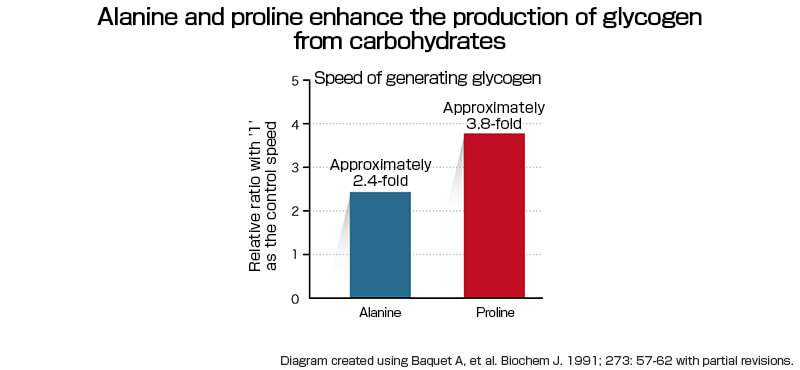Amino Acid Supplementation for Working Out
If used in the right way, amino acids supplementation can help with muscle conditioning and recovery, boost endurance, and build muscle mass more efficiently.
Table of contents
- Amino acids are absorbed into the body faster than proteins
- Leucine, alanine and proline enhance muscle recovery, improve endurance, and build muscle mass
- Leucine offers benefits for working out
- Leucine builds and repairs damaged muscles
- LEAA (leucine-enriched essential amino acids) can enhance exercise performance and muscle recovery
- Alanine and proline offer benefits for working out
- Amino acids help boost muscle mass with less protein and fat
- New research on whey protein enriched with EAA (essential amino acids)

Amino acids are absorbed into the body faster than proteins
Most professional athletes already know about the benefits of amino acids for sports. Nowadays, increasing numbers of amateur athletes and recreationally active adults are using amino acids supplements too.
Essential amino acids are required by the body in order to make muscle protein. When we exercise, our bodies require more of them to function well. Essential amino acids are especially abundant in foods high in protein, such as fish, meat, eggs, soybeans, and dairy products. In food form—namely protein—it takes three to four hours for the body to absorb amino acids. In crystalline form, however, the body can absorb them in just 30 minutes. This means we can consume amino acids when our bodies need them, making them ideal for sports and training.
Leucine, alanine and proline enhance muscle recovery, improve endurance, and build muscle mass
New research into three amino acids in particular––leucine, alanine and proline––suggests they can enhance muscle recovery, improve endurance, and build muscle mass more efficiently when taken in combination with other amino acids, carbohydrates, or whey protein. Here we will explain how.
Leucine offers benefits for working out
Protein loss leads to muscle weakness
During strenuous or prolonged exercise our bodies run out of energy and begin to break down muscle protein and convert its essential amino acids into energy. In addition, production of muscle protein decreases. This net protein loss leads to muscle weakness and diminished exercise performance.
Leucine builds and repairs damaged muscles
Leucine is one of three so-called branched-chain amino acids (BCAAs) which account for roughly 40% of the essential amino acids in muscle protein. Leucine is especially important owing to its role in switching on protein synthesis to build, maintain, and repair weak or damaged muscles. LEAA(leucine-enriched essential amino acids) is a mixture of nine amino acids formulated to promote quick and efficient production of muscle protein. Research indicates that the rate of muscle protein production is largely dependent on the amount of leucine present. Moreover, data shows that LEAA alleviates muscle weakness caused by protein breakdown for several days after exercise and accelerates recovery from physical muscle damage due to exercise.
LEAA can enhance exercise performance and muscle recovery
Supplementing with LEAA at the right time, such as before or during exercise, leads to less breakdown of muscle protein for energy. This reduces muscle fatigue during exercise and muscle damage afterward. Taking LEAA right after exercise or before bed helps damaged muscles recover faster and lessens soreness.
Alanine and proline offer benefits for working out
The amino acids alanine and proline help convert carbohydrates into glycogen, which consists of strings of glucose units that the body stores in muscle tissue and the liver. During exercise, muscles use glycogen as an energy source, while in the liver they are converted into glucose as needed to maintain blood glucose levels.
Supplementation with carbohydrates at the right time can maintain stamina and prevent fatigue
Endurance athletes, including long-distance runners, cyclists, and soccer players, know that supplementation with carbohydrates at the right time can maintain blood glucose, boosting stamina and preventing fatigue. This is because the body’s ability to store carbohydrates is limited. Studies show that after about an hour of exercise, blood glucose levels begin to decline. Hence, it is important to maintain the body’s supply to prevent shortages that cause fatigue.

Studies show that alanine more than doubles the speed of glycogen production, while proline almost quadruples it. A new study found that athletes who consumed a carbohydrate mixture containing both alanine and proline were able to maintain their performance significantly longer than those in a control group. In addition to consuming carbohydrates in the form of food throughout the day, it is very important for endurance athletes to supplement with an amino acids-enriched carbohydrate mixture during training and competition to maintain optimum performance.
- Learn more about how combined supplementation of carbohydrate, alanine and proline enhances physical endurance
- Learn more about how saccharides help prolong optimum performance
Amino acids help boost muscle mass with less protein and fat
Regardless of their chosen sport, weight training is widely practiced by amateur and professional athletes to build strength and boost performance. It is also increasingly popular with people who simply want to improve their general fitness or lose weight. For those wanting to add muscle mass, protein is an important nutrient.
Nutritionists recommend that, simply to maintain muscle mass, athletes and others who exercise more or less daily should consume two grams of protein per kilogram of body weight every day, which is twice the amount needed by normal healthy adults who are not as physically active. However, consuming this extra protein in the form of food may involve consuming unnecessary fats at the same time.
New research on whey protein enriched with EAA (essential amino acids)
Consuming powdered whey or other protein supplements is a popular way to get protein without unnecessary fat. Whey protein is efficiently absorbed and utilized by the body, but can suppress appetite, causing people to cut back on regular meals. However, new research shows that by helping the body produce protein more efficiently, whey powder enriched with a combination of nine essential amino acids—or EAA-enriched whey protein––can reduce the amount of protein needed to build muscle mass by about 25%. Moreover, this reduced amount of protein results in improvements in body composition, namely more muscle mass and a greater reduction in fat mass, while achieving equivalent gains in muscle strength, as compared to the standard amount of conventional whey protein.
- Learn more about EAA-enriched whey protein and muscle mass
- Learn more about the importance of nutrition and rest for more effective training
Find Out More
Amino Acids for Better Sports Performance
Content you may like

What Are Amino Acids? Essential Nutrients for All Life
Amino acids are organic compounds that make up proteins and are the source of our very life. This article provides an overview of amino acids, ...

Amino Acids for Healthy Aging
Leveraging amino acids to extend healthy life expectancy Amino acids are important for addressing loss of muscle mass as we ageAs we get older, we ...

Amino Acids and Alcohol
Amino acids (alanine and glutamine) assist liver function. Alanine and glutamine are glucogenic amino acids that make glucose in the body to provide energy. Taking ...
